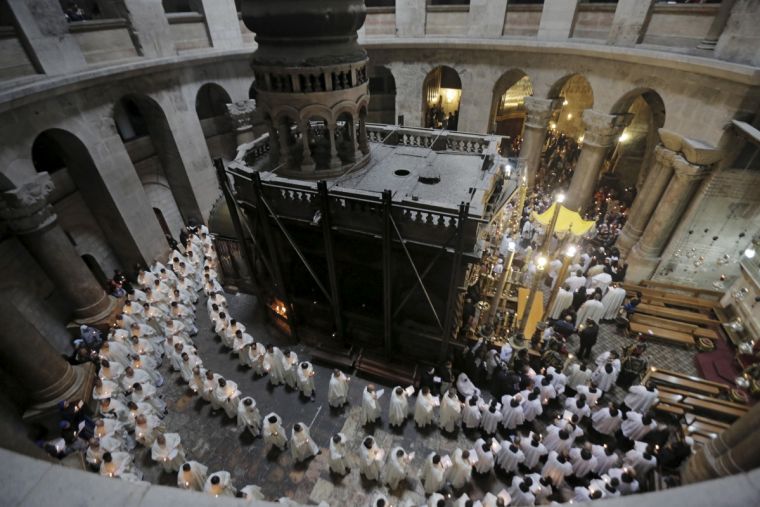Jesus' 'Burial Slab' Uncovered For First Time In Centuries

A stone shelf believed by many Christians to have held the body of Jesus after his crucifixion has been uncovered for the first time in centuries.
Located in the Church of the Holy Sepulchre in Jerusalem, the stone slab has for years been encased by marble.
"The marble covering of the tomb has been pulled back, and we were surprised by the amount of fill material beneath it," Fredrik Hiebert, archaeologist-in-residence at the National Geographic Society, told the organisation's website.
"It will be a long scientific analysis, but we will finally be able to see the original rock surface on which, according to tradition, the body of Christ was laid."
The church is visited by hundreds of thousands of pilgrims every year and its ownership and maintenance is shared in a complex arrangement between the Armenian, Greek Orthodox and Catholic Churches.
It is currently undergoing restoration work after being damaged by many years of exposure to humidity from the condensation from the breath of visitors, and thermal stress caused by candles burning for hours nearby.
The shrine at the heart of the complex called the Aedicule, the supposed location of the tomb of Jesus, is being renovated at a cost of $3.4 million and the monument, which in its present form dates back to 1810, is being completely rebuilt. The restoration is expected to be finished in 2017.
The renovations will see the marble slabs taken off, the 12th century Crusader shrine beneath the Aedicule repaired and the cracks in the rock-hewn tomb under that filled. The noisy work is being undertaken at night to minimise the disruption to pilgrims.
Professor Antonia Moropoulou, the chief scientific supervisor of the project, told National Geographic that his team had reached "the critical moment for rehabilitating the Aedicule".
"The techniques we're using to document this unique monument will enable the world to study our findings as if they themselves were in the tomb of Christ," he added.
The Greek Patriarch of Jerusalem, Theophilus III, was waiting outside the Aedicule when Jesus' supposed burial shelf was exposed. He said the "atmosphere was special".
"Here we have Franciscans, Armenians, Greeks, Muslim guards, and Jewish police officers," he added. "We hope and we pray that this will be a real message that the impossible can become the possible. We all need peace and mutual respect."











